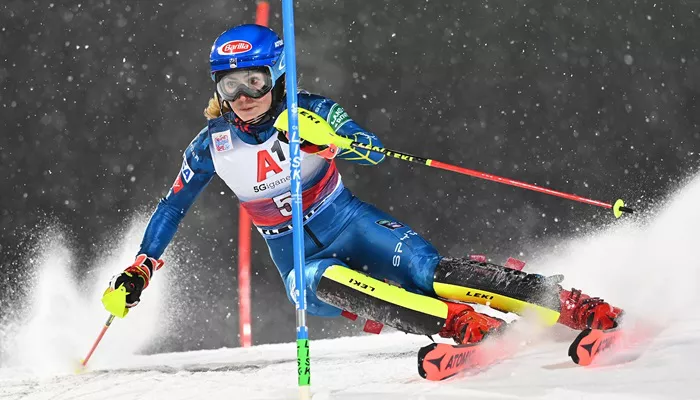Mikaela Shiffrin stands as one of the most dominant alpine skiers in history. Her achievements continue to inspire athletes worldwide. Yet many wonder: when did Mikaela Shiffrin start skiing? Understanding her beginnings offers insight into the making of a champion. This article details Shiffrin’s early years, training path, influences, and how young skiers today can follow a similar trajectory. For those seeking a comprehensive approach to learning, our Skiing Guide provides additional resources and techniques to develop skiing excellence.
When Did Mikaela Shiffrin Start Skiing?
Introduction to the Slopes
Mikaela Shiffrin began skiing at an incredibly young age. By the age of two, she was already gliding on snow. Growing up in Vail, Colorado, Mikaela’s environment nurtured her love for skiing naturally and effortlessly.
Family Influence
Both of Mikaela’s parents, Jeff and Eileen Shiffrin, were avid skiers. Her father’s background in collegiate skiing and her mother’s competitive instincts laid the foundation for Mikaela’s rapid development.
First Ski Experiences
Mikaela’s earliest memories involve skiing with her family. Early exposure combined with structured yet playful learning allowed her to develop balance, confidence, and enthusiasm.
The Importance of Early Exposure in Skiing
Neuromuscular Development
Starting young enhances balance, coordination, and muscle memory. Mikaela’s early start exemplifies the benefits of beginning while the brain and body are most adaptable.
Building Confidence on Snow
Familiarity with snow conditions and terrain variations at a young age creates fearless, instinctive skiers who move naturally with the environment.
Understanding Terrain
Frequent exposure to diverse slopes helped Mikaela read snow, anticipate changes, and react swiftly—key skills at elite levels.
Mikaela Shiffrin’s Early Training Milestones
Formal Lessons and Structured Practice
While initially self-guided with family, Mikaela soon entered formal programs. She trained with established youth ski clubs known for cultivating talent.
Elite Ski Academies
Mikaela later attended Burke Mountain Academy in Vermont. Known for rigorous academics and world-class ski training, Burke refined her raw skills into competitive dominance.
Junior Competitions
From a young age, Mikaela dominated junior races. Her technical precision and mental toughness became evident, setting her apart from peers.
Key Factors Behind Mikaela Shiffrin’s Rapid Progression
Supportive Environment
Family, coaches, and institutions provided Mikaela with unwavering support, emphasizing both performance and enjoyment.
Exceptional Work Ethic
From the start, Mikaela displayed a relentless dedication to improvement. Long hours on snow, video analysis, and strength conditioning characterized her approach.
Focus on Technical Excellence
Rather than focusing solely on speed, Mikaela prioritized perfecting turns, balance, and edge control—essential elements for long-term success.
Transitioning from Young Skier to World-Class Competitor
FIS Races and International Recognition
At 15, Mikaela Shiffrin made her debut in FIS (International Ski Federation) competitions. She immediately attracted attention for her poise and technical mastery.
World Cup Breakthrough
By 16, she achieved her first World Cup podium. At 17, Mikaela won her first World Cup race, cementing her place among the sport’s elite.
Lessons for Young Athletes from Mikaela Shiffrin’s Journey
Early Skill Development Matters
Starting young provides a huge advantage, but proper technique, fun, and progression remain equally critical. Resources like our Skiing Guide offer excellent pathways for beginners.
Balanced Training Approach
Physical conditioning, mental preparation, and technique refinement should evolve together. Neglecting any aspect can hinder overall development.
Resilience Through Challenges
Injuries, defeats, and setbacks are inevitable. Mikaela’s career reflects an unwavering ability to overcome obstacles and continue striving toward excellence.
The Role of Parental and Coaching Support
Guidance Without Pressure
Mikaela’s parents encouraged her passion without enforcing unrealistic expectations. They fostered autonomy and self-motivation.
Expert Coaching
Early collaboration with expert coaches introduced Mikaela to best practices, tactical awareness, and advanced techniques well ahead of her peers.
Holistic Development
Education, emotional wellbeing, and athletic training were prioritized equally. Such an approach produced a well-rounded athlete capable of sustaining long-term success.
Training Techniques That Shaped Mikaela Shiffrin’s Style
High Repetition of Basic Drills
Shiffrin’s training involved endless repetitions of basic turns and carving drills, reinforcing perfect technique until it became second nature.
Cross-Disciplinary Practice
Practicing multiple disciplines—slalom, giant slalom, super-G—enhanced adaptability and prevented specialization too early.
Visualization and Mental Rehearsal
Visualization exercises allowed Mikaela to mentally prepare for races, sharpening focus and enhancing muscle memory without physical fatigue.
Common Misconceptions About Early Skiing Success
Myth: Only Genetics Matter
While natural ability plays a role, consistent practice, intelligent training, and mental resilience shape long-term outcomes far more significantly.
Myth: Start at Elite Academies Immediately
Grassroots development and fun skiing experiences at local hills are often more important initially than high-pressure academy environments.
Tips for Parents Hoping to Develop Young Skiers
Prioritize Enjoyment
Children must first love skiing. Without joy, motivation and improvement quickly fade.
Choose the Right Programs
Look for programs that emphasize technique, safety, and progressive learning over immediate competition results.
Encourage Balance
Ensure kids pursue other interests alongside skiing. A well-rounded life leads to better emotional and athletic development.
How Mikaela Shiffrin Continues to Inspire in 2025
Expanding Her Legacy
In 2025, Mikaela continues to break records. Her success inspires new generations to dream big and work hard, both on and off the slopes.
Mentoring Young Athletes
Mikaela actively supports young skiers through clinics, social media, and personal appearances, sharing insights gained through years of elite competition.
Focus on Sustainability and Growth
Beyond competition, Mikaela promotes sustainable practices within skiing, aiming to protect winter sports for future generations.
Conclusion
Mikaela Shiffrin’s skiing journey began almost before she could walk. Early exposure, supportive environments, exceptional work ethic, and balanced development propelled her to greatness. Her story offers valuable lessons for athletes, coaches, and parents alike. Whether you’re a newcomer seeking a structured path or a parent looking for guidance, our Skiing Guide provides essential tools for success. Start early, train smart, and stay passionate—just like Mikaela.

